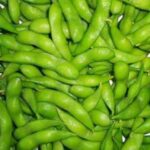 Researchers at the University of California, Davis, studied the response to soy hypocotyl isoflavone supplementation in healthy menopausal women.
Researchers at the University of California, Davis, studied the response to soy hypocotyl isoflavone supplementation in healthy menopausal women.
In the plant seed, the hypocotyl connects the embryonic root to the seed leaf.
First, the details.
- 403 postmenopausal women were assigned to a treatment group for 24 months.
- 80 or 120 mg aglycone equivalent soy hypocotyl isoflavones + calcium and vitamin D daily
- Placebo
- Blood chemistry values were measured and a well-woman examination was conducted, which included a mammogram and a Papanicolaou (PAP) test.
- The presence of endometrial thickening and fibroids were evaluated.
- Neither the patients nor researchers knew the treatment given — double blind.
And, the results.
- The groups were similar at the start of the study.
- After 2 years of taking daily isoflavone, all clinical chemistry values remained in the normal range.
- The only variable that changed significantly was blood urea nitrogen (a measure of kidney function), which increased significantly after 2 years but not after 1 year in the supplementation groups.
- Isoflavone supplementation did not affect lymphocyte or serum free thyroxine concentrations.
- No significant differences in endometrial thickness or fibroids were observed between the groups.
- 2 serious adverse events were detected (1 case of breast cancer and 1 case of estrogen receptor-negative endometrial cancer), which was less than what was expected for this population of women.
The bottom line?
The authors concluded, “Daily supplementation for 2 years with 80 to 120 mg soy hypocotyl isoflavones has minimal risk in healthy menopausal women.”
12/27/10 21:10 JR